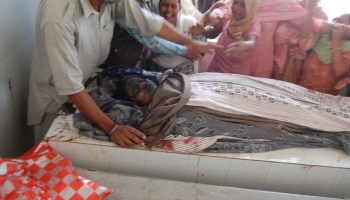Jammu, Nov 1: Eight people were killed and 22 injured when Pakistan troops heavily shelled border hamlets and posts with mortar bombs along the International Border (IB) and the LoC in Samba, Jammu, Poonch and Rajouri districts of Jammu and Kashmir today.
Two women were killed and 13 others injured during shelling with 82 and 120 mm mortar bombs in Rajouri, Jammu, Poonch districts.
Army sources said two Pakistani soldiers have been killed opposite to Noushera sector along the LoC in Rajouri district. "Five people died and nine others were injured in the shelling in Ramgarh sector of Samba district today," Deputy Commissioner Samba, Sheetal Nanda told PTI.
"One persons died due to shock during shelling in the same area taking the total of those killed to six," she said. While three of the injured were given treatment in Ramgarh hospital, the rest were shifted to GMC hospital in Jammu, she said. The casulaties took place during shelling in Jarda and Rangoor camp villages along the IB in Ramgarh sector.
Along the LOC, two women were killed in firing and shelling by Pakistani troops in Panjgrian border hamlet in Manjakote belt of Rajouri district, Deputy Commissioner Rajouri, Shabir Ahmed Bhat said.
He said three army porters suffered injuries in the shelling in Noushera sector of the district and they have been hospitalised. Pakistani shells landed in Mendhar town of Poonch district, injuring three people, police said.
A total of 18 people, including 12 civilians, have been killed and more than 80 suffered injured in Pakistani shelling and firing along IB and LoC in Jammu since surgical strikes against terror launch pads by the Indian Army in Pakistan- occupied Kashmir.





Comments
Add new comment